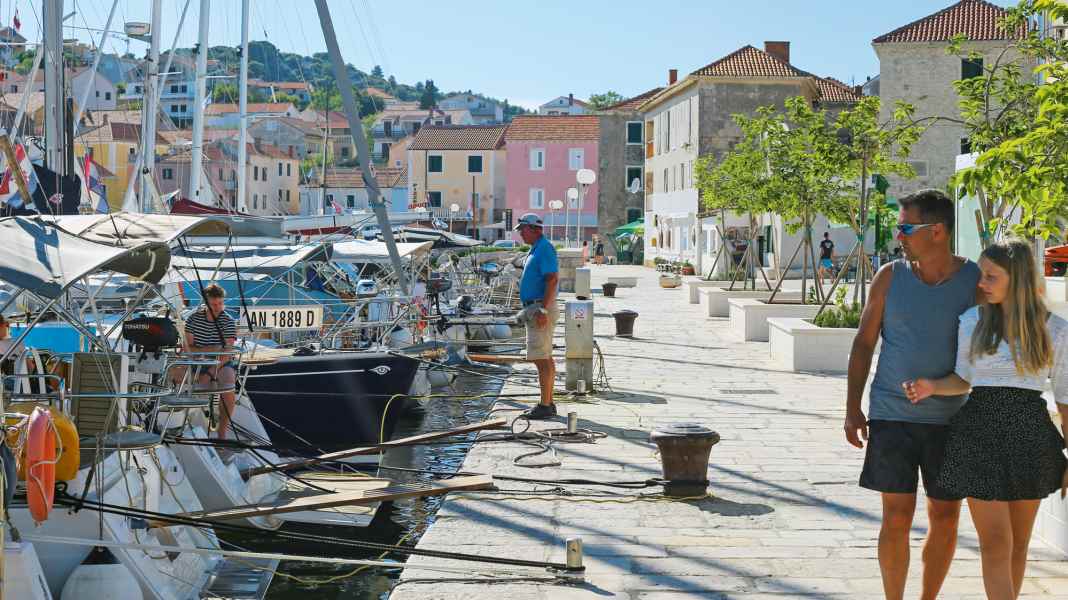
Warm water, picturesque landscapes and guaranteed perfect weather. Many German sailors prefer the waters of southern Europe to their home waters. And some people think about buying a second-hand yacht in the Mediterranean during their charter holiday. If you don't want to stop dreaming, there are a few special features to bear in mind, as the used boat trade there usually follows the standards of the Mediterranean Yacht Brokers Association (MYBA). And these differ from the practices in Northern Europe.
The MYBA was founded in 1984 as a network of superyacht brokers to support its members in the trade. To this end, a standardised set of rules was created for the purchase of used superyachts. Intentionally or unintentionally, this has also become established over the last few decades in the recreational yacht trade by simply being copied or being the inspiration for dealers' and brokers' own contracts.
The basic principles of the original, whether labelled "MYBA standard" or otherwise, are applied in most used boat sales on the Mediterranean today and it is therefore worth taking a closer look at these rules before starting your search.
Many things that are considered balanced regulations in the superyacht sector are rather grotesque and off-putting when buying smaller yachts.
The MYBA terms and conditions
Once the prospective buyer has found an interesting used boat on the Internet and contacted the broker, the broker will send him a more or less detailed exposé of the boat. But even before the first viewing of the boat takes place, a contract should actually be concluded. And this is not - as is often assumed - a kind of preliminary contract, but the final purchase contract in accordance with the MYBA standard.
Purchase price and terms of payment
The contract usually provides for a deposit of ten per cent of the negotiated purchase price to be paid into an escrow account. This deposit is intended to secure the costs of demonstrating the boat and any damage during a sea trial. However, it can also be used by rogue brokers as leverage against the buyer. To rule this out, it is advisable to pay the deposit into the account of an uninvolved trustee. Unfortunately, estate agents often refuse to involve such a trustee. The buyer then has no choice but to accept the estate agent's condition and pay the deposit to him.
It is obvious that reclaiming such a deposit in other EU countries can be associated with some difficulties, so this step should be carefully considered. Choosing a reputable broker can provide security here.
Test drive and inspection of the ship
This is followed by the "sea trial", an inspection of the yacht with a test drive. The focus here is less on technical details and more on the visual impression and performance of the boat. According to the contract concluded, the buyer then typically has the right to withdraw from the contract without giving reasons. The deposit paid must then usually be refunded within 48 hours.
If the sea trial is satisfactory to the buyer, an intensive technical survey of the boat is carried out by an expert. This "condition survey" must be carried out by a professional sports boat surveyor and also includes an inspection of the hull on dry land.
After the condition survey, the buyer can only withdraw from the contract if the surveyor identifies significant technical defects that seriously jeopardise the safety or seaworthiness of the boat. The seller is then initially free to remedy the defects found within a short period of time or to reduce the purchase price accordingly. In either case, the parties must agree on how to proceed, otherwise the contract will be cancelled and the deposit refunded. If the buyer does not declare cancellation of the contract within seven days of the condition survey, the ship shall be deemed to have been accepted in accordance with the contract.
Ship documents
Only now does the broker provide the existing documents for the boat. As a rule, these are the registration, proof of tax status and the CE conformity documents. The registration provides information about the actual owner of the yacht as well as any registered encumbrances such as liens or mortgages.
It is not uncommon for the ship to still be covered by a leasing contract during the sales phase. In this case, it is not the seller who is the legal owner, but the leasing bank.
This is rarely seen as a problem by brokers, although the deposit is used to pay off the lease while the buyer has only entered into a contract for the sale of the yacht with a person who is not the current owner. Legal advice should be sought in such situations. However, they are usually easy to handle if the contract is amended accordingly and the leasing bank agrees to the sale in writing.
Transfer of ownership and change of registration
The final step is the handover and transfer of ownership of the ship in exchange for payment of the remaining purchase price, the so-called balance payment. This payment should also be made to an escrow account and not directly to the seller.
It is reasonable for the trustee to pay the full purchase price to the seller only once the seller has cancelled the previous entry in the shipping register. This is because, as in the case of real estate, the person who is listed in the register is to be regarded as the owner. What is meant here is not a registration for the issue of the International Boat Licence by DSV, DMYV or ADAC, but an official registration with the state authorities.
A bill of sale must be issued to prove the transfer of ownership to an official register. In this document, the seller confirms receipt of the purchase price and the transfer of ownership of the ship.
The Bill of Sale is only signed by the seller. Traditionally, it shows 64 shares of the ship, and all 64 shares must be transferred - because in earlier times, the holds of merchant ships were divided into 64 compartments between the frames and were sold individually.
It is usually advisable to register the yachts in a German shipping register. In addition to the purchase contract and the bill of sale, a measurement certificate from the BSH must also be submitted. The seller often already has such a document, which simplifies the application for a German tonnage certificate.
Place of jurisdiction and choice of law
The MYBA standard provides for British law and the jurisdiction of the London Court of Arbitration for Maritime Matters. Brokers rarely think of changing this.
If the British arbitrators are used, a quick and fair solution can be expected, but the procedure is not exactly favourable.
In this country, there is no such arbitration centre for yacht purchases, although it would certainly make sense. Ultimately, the only option in contract negotiations is to insist on the jurisdiction of ordinary courts in the seller's country, as there are simply no arguments in favour of the jurisdiction of German courts. In view of the low chances of success in the event of a legal claim abroad, it is all the more important to have the ship carefully inspected by an expert before the purchase and to monitor the payment process.
Overall, buying a yacht in the Mediterranean offers the opportunity to experience marvellous sailing adventures. However, knowing and understanding the MYBA contract conditions is essential in order to successfully overcome the challenges and differences to German standards.
Benyamin Tanis

The yachtsman and lawyer from Kiel has been advising and representing his clients for many years with a team of several lawyers, boat and ship builders and a Europe-wide network of partner law firms in all legal matters relating to yachting, from the purchase of a yacht to tax and customs matters and the handling of claims.

